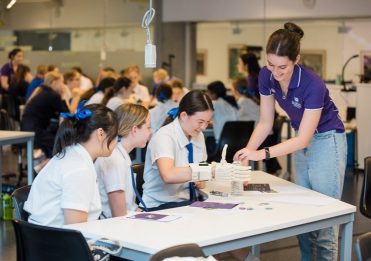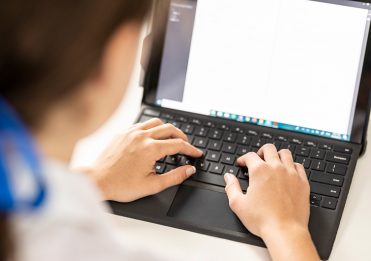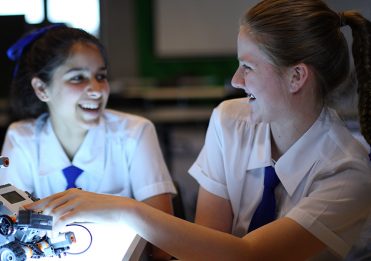The Quest 2019
Last week, Brisbane Girls Grammar School and Brisbane Grammar School united in the annual Quest. The Quest is an established combined-schools Year 8 learning activity, developed by experienced teaching staff, which engages our two schools in peer-level problem solving. Lead by teachers from our Technologies, Mathematics and English Faculties, this year’s Quest targeted computational and design thinking skills to develop a technology solution.
The day commenced with a lecture series from The University of Queensland (UQ), Associate Professor Stephen Viller, and Dr Marie Boden, both from the School of Information Technology and Electrical Engineering under the Faculty of Engineering, Architecture and Information Technology. Their presentations highlighted the importance of design, computer science and electronics education in secondary schooling and the direct links to the evolving fields of interaction and multimedia design.
Students were also fortunate enough to be supported by The University of Queensland’s Women in Engineering representatives. The UQ Women in Engineering student leaders are current engineering students with a passion to inspire, encourage and support prospective and current female engineering students and provided our students with problem-solving advice, mentorship, collaboration and systems thinking strategies.
The Quest incorporated six missions where students used their computational thinking skills to code a microprocessor for NASA in order to communicate to aliens with a GPS signal via coloured LEDs. The mixed-teams of students designed, produced and manufactured a piece of wearable technology including the microprocessor. This year’s Quest genuinely highlighted the students’ energetic collaboration skills, critical problem-finding and design thinking skills.
JavaScript coding was used to program the microprocessor to route the GPS coordinates. The GPS coordinates were then emitted as particular light colours for longitude and latitude reference. The students sequentially learned about binary coding to create numbers, decryption, encryption and basic JavaScript programming.
The intrepid ‘Questers’ had to fabricate a method of wearing the light emitting microprocessor. The day culminated in a presentation of the student’s wearable technology to their peers. There were an array of fantastic wearable devices designed, spanning from gloves, eye patches, shoes and head wear.
Teaching these valuable design and digital technology skills will improve their ability to be agile with digital literacy and thus improve their future problem solving in diverse situations.
Guest lecture on Circular Economy
On Monday 19 August, Year 10 Design and Digital Technologies students were delighted to hear from The University of Queensland’s Associate Professor Glen Corder, Acting Director and Group Leader in the universities Sustainable Mineral Institute. This was organised through the UQ Women in Engineering program who started the guest lecture sharing their message on how to make an impact with Engineering and stories of young inspiring females pursuing amazing careers in the engineering and circular economies space such as UQ PhD candidate at the School of Chemical Engineering, Leela Dilkes-Hoffman who is stuying new forms of biodegradable plastics. Associate Professor Corder then shared his research and insight into industrial ecology, the circular economy and sustainability risk management frameworks in the mining and minerals industry.
The lecture formed part of the Year 10 cohort’s current investigation into circular economy, which is part of their business enterprises unit. The Year 10 unit focuses on designing a textile manufacturing business using the circular economy approach. The primary challenge for our students is to investigate textile production in Australia and then theoretically present how their innovative business model could reduce waste to maximize resources and material production, connect local organisations and integrate smarter use of technology systems. Associate Professor Corder introduced our students to the Ellen Macarthur Foundation which provides an extensive international learning hub, launched in 2010 to accelerate the transition to a circular economy.
Associate Professor Corder’s visit to Girls Grammar provided students with an insight in to how a circular economy can improve Australia’s commercial productivity and the global environmental benefits that come through minimizing waste.
Mr Brendon Thomas
Director of Technologies
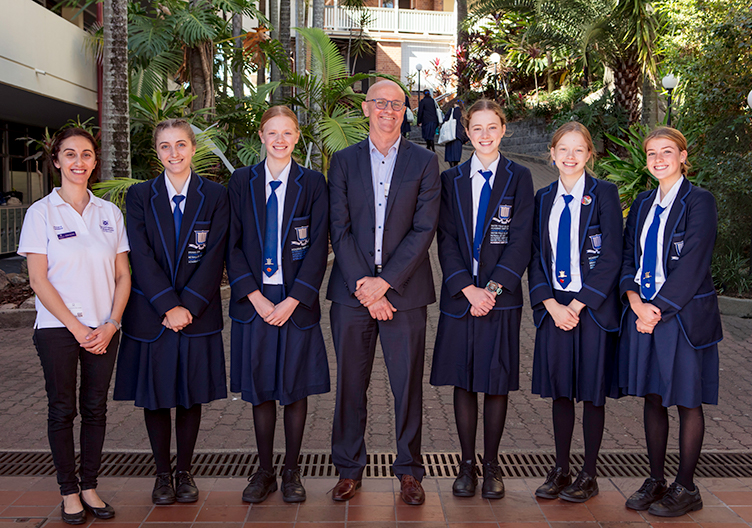
Ms Negin Beaton from The University of Queensland Women in Engineering, Brooke Goston (10E), Alexandra Playford (10H), Associate Professor, Glen Corder, Abigail King (10R), Annabel Douglas (10R) and Lily Tobin (10M).
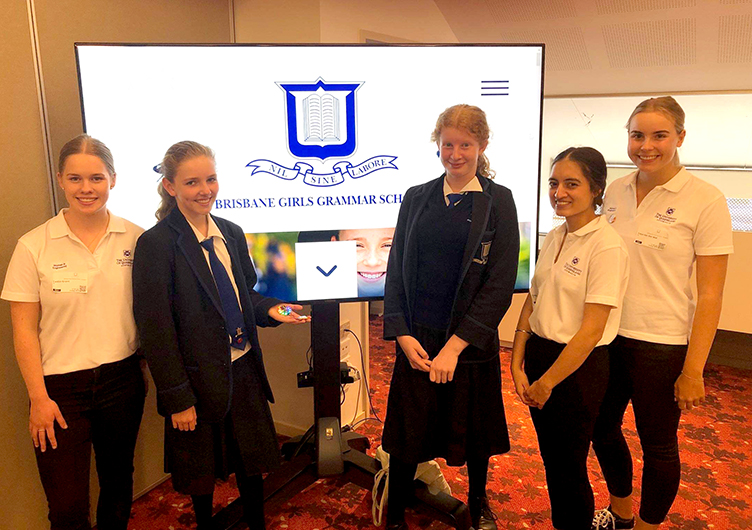
UQ Women in Engineering Student leaders with Charlotte King (8R) and Tabatha Henley (8R).


